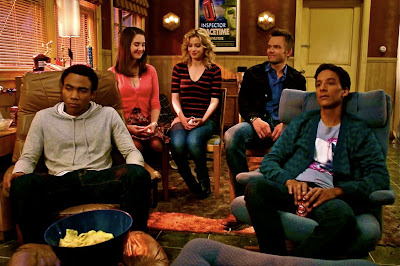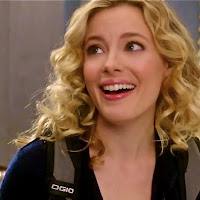For the longest time I've had a problem
with Britta Perry. I don't like her. I found her obnoxious,
overbearing, and way too involved in everyone else's issues when she
should be focusing on herself. She irritated me. Then there was the
constant will-they won't they romance with Jeff (when I totally ship
Jeff/Annie), and her insistence on dating horrible guys and making
awful life choices. Britta was not my favorite. I even took a poll of
my friends, and she wasn't anyone's favorite. She's wasn't even most
of their backup favorite. She was about as popular as Pierce.
And that kind of annoyed me, from an
ideological perspective. Here we had a character who was great on
paper: feminist, interesting, a protester, into cool bands,
reasonably compassionate, who sticks up for herself, and I can't
stand her.
What gives?
Well, according to Gillian Jacobs and
Dan Harmon (the actress and show's creator, respectively), that's
kind of the point. In an interview at WonderCon on March 18th (which
I actually got to attend, and it was awesome, oh yes), Harmon
explained that Britta's character was originally conceived as a
"carrot to get the Jeff character into the study group".
They wrote her by throwing in a pile of the most attractive qualities
they could think of for a woman into a pile, and making her a
character, figuring they would flesh her out if the show got picked
up.
They did (obviously), and Harmon
brought Britta up to the writing staff. One of his female writers
immediately said, "I hate her." Harmon was surprised by the
vehemence, and asked why. The writer responded, "She seems like
the kind of woman who, if you went shopping with her, would yell at
you for trying on heels." (Or something like that. I took notes,
but verbatim this isn't.)
And here's the gold. Harmon thought,
okay. This is a character women hate. Good. Let's run with that.
Let's run with that.
 |
| I come from a long line of wives and mothers. |
Instead of retconning Britta's
character and making her more palatable to female viewers, Harmon
decided to work with Jacobs to make Britta real, a woman who women
hate, a fully fledged character who had all of the traits he'd given
her, and showed how irritating a person with all of those traits
would be.
That's AWESOME.
As Jacobs explained, it's what made
Britta lovable. "She tries so hard, and gets knocked down and
just shit on all the time. And then she tries again. She has no
self-awareness and no learning curve and I love her for it."
What Harmon and Jacobs did is actually
show us what the male ideal looks like when she's translated into the
real world. It isn't pretty. She's kind of a bitch, and no one wants
to go to the bathroom with her, because she will tell you that your
heels are an emblem of the patriarchy. She meddles, she's
self-righteous, she's kind of a skank, and she has disturbingly low
self-esteem. It's great, because it's real.
Knowing this made me like her. Because
she's supposed to be cool, but actually kind of awful, and just the
tiniest bit aware of it, made her cool again. It's the bad movie
effect, if you will. Britta is a bad movie writ large, and we can
either mock her or marvel at her. Or both. I choose both.
 |
| Read the banana, Britta. |
I also choose to appreciate the fact
that Harmon went on to add in a few choice bits about writing. When
men write about women, as they typically do in Hollywood, because
there are so few commercially successful female writers (Grr.
Arrgh.), they write about them as "others". Men, they give
foibles and character traits that they themselves understand, because
they can relate to men. Women, though, are so foreign and different,
that men are reduced to giving them the flaw of clumsiness and a
weakness for shopping. The key, Harmon explained, is to treat women
like people. Not as objects or icons, but just normal people with
normal flaws. Britta says bagel wrong because Harmon says bagel
wrong. Once you're able to view female characters as normal people
with completely normal, fleshed out flaws, you'll be a lot closer to
having a story that is good and true.
So take a deep breath next time you
watch Community and you feel
like you're going to strangle Britta, it's okay. You're supposed to.
It's
good for you.
 |
| Community is also good for you. On Thursdays at 8 EST on NBC. |



That is how I started liking Britta. She was okay enough in the beginning since there wasn't enough to her character to dislike but then as the series progressed I hated her and it wasn't until I realized that the other characters did as well and that it was kind of the point that I started liking her again and realizing that she wasn't "the worst."
ReplyDeleteWhen the writers and actors and characters are all aware of the problem and aren't trying to suggest or force us to believe that an unlikable person is likable or the best then it becomes okay to like that person. If more shows did that with their Mary Sues fans wouldn't hate them so much. It's laugh at us or laugh with us. The Community writers chose to be in on the joke.
Since when is feminist a good thing? Everyone hates feminists. And every time she opens her mouth to spout her leftist nonsense I honestly feel like punching the screen. The only redeemable quality in her is the fact that she makes Shirley look more likeable. At least the writers came to realize how stupid she is and now feel comfortable in portraying her as the big joke that liberals truly are.
ReplyDeleteWow, you missed the joke pretty widely there sport. Also most people don't think of feminism as a bad thing anymore.
DeleteHi
DeleteOmg f you lol you sound like the worst person on earth who tf cares about your opinion scumbag
DeleteI was reading another book with a similar character to Britta the other day, and as I read this critique, I wondered: why can't this character type have a character development arc? It seems to me that a character similar to Britta that wants to explore other life choices other than hooking up with an alpha male and starting a family is deemed a failure by authors/writers of fiction books and tv sitcoms.
ReplyDeleteI am a man, but I have at least 2 sisters who have made commitments to the greater society/community at the cost of not being to have a family of their own. One is a community doctor serving in poor mountain areas, and another is a government prosecutor. People apply pejoratives like "social justice warriors" to young people who are younger versions of my sisters - the notion in fiction that feminists like these are either failures or jokes carries over in real life in, for instance, how Gloria Allred is dismissed as a feminist lawyer, or how my parents tries to "setup" my sisters with dates in the hopes that they get married and have children.